沪教版牛津英语A_unit
七上英语沪教牛津新版词汇表
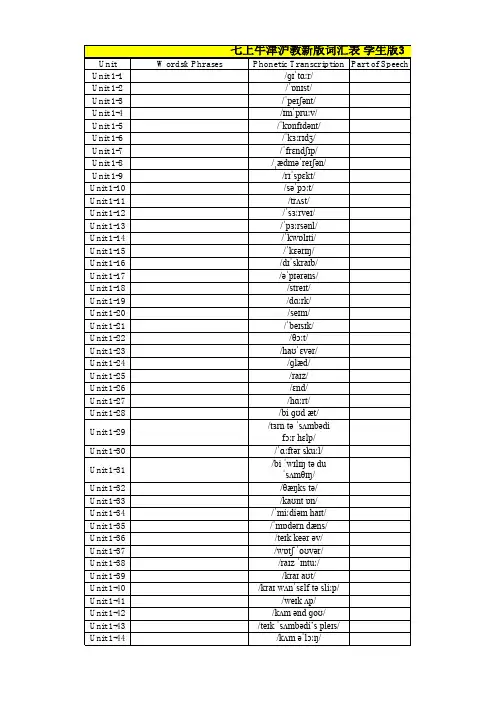
/bi ɡʊd æt/
/tɜrn tə ˈsʌmbədi fɔːr hɛlp/
/ˈɑːftər skuːl/
/bi ˈwɪlɪŋ tə du ˈsʌmθɪŋ/
/θæŋks tə/ /kaʊnt ɒn/ /ˈmiːdiəm haɪt/
/ˈmɒdərn dæns/ /teɪk keər əv/ /wɒtʃ ˈoʊvər/ /raɪz ˈɪntuː/ /kraɪ aʊt/
/bɜːn/ /ɔɪl/ /ɡæs/ /ˈhɑːmfəl/ /ˈwɛbˌsaɪt/ /əʊn/ /ˈempərə(r)/ /hʌnt/ /wɔː(r)/ /ˈsændˌstɔːm/ /səˈluːʃn/ /bləʊ/ /ˌdʒenəˈreɪʃn/ /ˈsəʊlə ˈsɪstəm/ /fækt faɪl/ /biː ˈkʌvəd baɪ/ /æz fɑː æz wiː nəʊ/ /siː ˈlɛvəl/ /wɒts mɔː/ /prəˈvaɪd wɪð/ /ˈplæstɪk pəˈluːʃn/ /kʌt daʊn/ /ˈhʌndrədz əv/ /bləʊ əˈweɪ/ /ˈspeɪssuːt/ /kəˈlekt/ /liːv/ /ˈkɪləmiːtə(r)/ /wiːk/ /taɪ/
Unit 4-16 Unit 4-17 Unit 4-18 Unit 4-19 Unit 4-20 Unit 4-21 Unit 4-22 Unit 4-23 Unit 4-24 Unit 4-25 Unit 4-26 Unit 4-27 Unit 4-28 Unit 4-29 Unit 4-30 Unit 4-31 Unit 4-32 Unit 4-33 Unit 4-34 Unit 4-35 Unit 4-36 Unit 4-37 Unit 4-38 Unit 4-39 Unit 4-40 Unit 4-41 Unit 4-42 Unit 4-43 Unit 4-44 Unit 4-45 Unit 4-46 Unit 4-47 Unit 4-48 Unit 4-49 Unit 5-1 Unit 5-2 Unit 5-3 Unit 5-4 Unit 5-5 Unit 5-6
沪教版牛津英语二年级上册2A全册教案
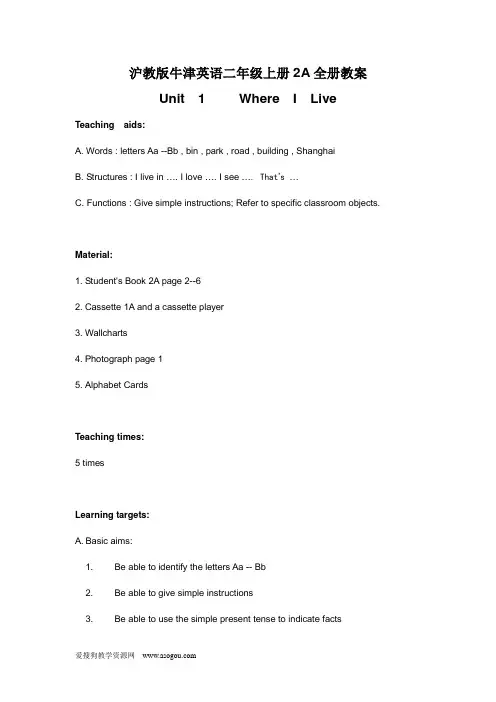
沪教版牛津英语二年级上册2A全册教案Unit 1 Where I Live Teaching aids:A. Words : letters Aa --Bb , bin , park , road , building , ShanghaiB. Structures : I live in …. I love …. I see …. That’s …C. Functions : Give simple instructions; Refer to specific classroom objects.Material:1. Student's Book 2A page 2--62. Cassette 1A and a cassette player3. Wallcharts4. Photograph page 15. Alphabet CardsTeaching times:5 timesLearning targets:A. Basic aims:1. Be able to identify the letters Aa -- Bb2. Be able to give simple instructions3. Be able to use the simple present tense to indicate facts4. Be able to "point to your home"5. Read the rhymeB. Further aims:1.2.Practise saying a new rhyme substituting 'Shanghai' with another places Language focus:1. Using the definite article to refer to specific classroom objects2. Using the simple present tense to express interests and preferences3. Learning the words: bin , park , road , building , ShanghaiPeriod 1Teaching focus:Using imperatives to give simple instructionsUsing the definite article to refer to specific classroom objectsTeaching steps:Period 2Teaching focus:Using the simple present tense to indicate factsUsing the simple present tense to express interests and preferences Teaching steps:Period 3Teaching focus:Using nouns to identify objectUsing proper nouns to refer to places Teaching steps:Period 4Teaching focus:Asking ' Wh-' questions to find out various kinds of specific information about a person Using the simple persent tense to express truthUsing the simple persent tense to express interests and preferencesTeaching steps:Period 5Teaching focus:Using the simple persent tense to express interests and preferences Teaching steps:Unit 4 Going about Teaching designing:Teaching aids:A.Words: letters Gg—Hh, plane, ferry, train, taxi, car, bus, van.B.Structures: Get ……How do you go to……C.Functions: Give simple instructions; Using connectives to add information Material:1.Student’s Book 2A page 17-212.Cassette 1A and a cassette player3.Wall charts4.Photograph page 145.Alphabet CardsTeaching times:5 timesLearning targets:A.Basic aims:1.Be able to identify the letters Gg--Hh2.Be able to give simple instructions3.Be able to introduce oneself using I’m.4.Be able to write the sentence Hello, I’m <name>.5.Sing a song.B.F urther aims:ing more information to introduce oneself2.The sorts of the alphabetLanguage focus:ing imperatives to give simple instructions2.Asking How questions to find out means and Using prepositions to indicatemeas3.Learning the words: plane……Period 1Teaching focus:Using imperative to give simple instructions Teaching steps:Period 2Teaching focus:Asking How questions to find out mean Using prepositions to indicate means Using formulaic expressions to take leave Teaching steps:Period 3Teaching focus:Using nouns to identify forms of transport. Teaching steps:Period 4Teaching focus:Using formulaic expressions to indicate how people travel Teaching steps:。
一年级英语沪教牛津版
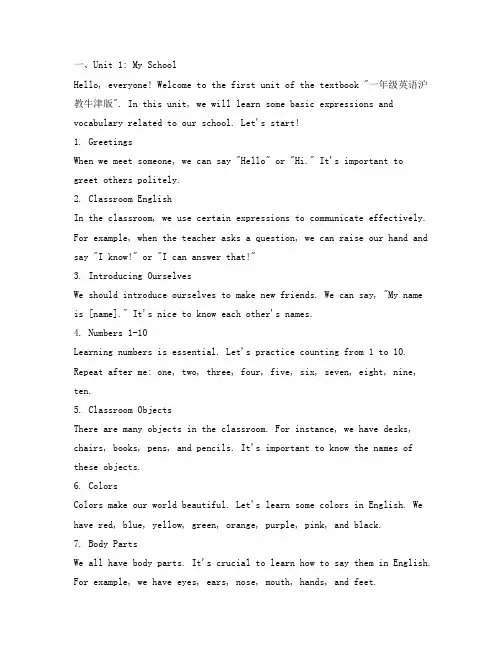
一、Unit 1: My SchoolHello, everyone! Welcome to the first unit of the textbook "一年级英语沪教牛津版". In this unit, we will learn some basic expressions and vocabulary related to our school. Let's start!1. GreetingsWhen we meet someone, we can say "Hello" or "Hi." It's important togreet others politely.2. Classroom EnglishIn the classroom, we use certain expressions to communicate effectively. For example, when the teacher asks a question, we can raise our hand and say "I know!" or "I can answer that!"3. Introducing OurselvesWe should introduce ourselves to make new friends. We can say, "My name is [name]." It's nice to know each other's names.4. Numbers 1-10Learning numbers is essential. Let's practice counting from 1 to 10. Repeat after me: one, two, three, four, five, six, seven, eight, nine, ten.5. Classroom ObjectsThere are many objects in the classroom. For instance, we have desks, chairs, books, pens, and pencils. It's important to know the names of these objects.6. ColorsColors make our world beautiful. Let's learn some colors in English. We have red, blue, yellow, green, orange, purple, pink, and black.7. Body PartsWe all have body parts. It's crucial to learn how to say them in English. For example, we have eyes, ears, nose, mouth, hands, and feet.Remember to practice these words and expressions every day to improve your English skills. Let's have a great time learning English in "一年级英语沪教牛津版"!二、Unit 2: My FamilyWelcome to the second unit of "一年级英语沪教牛津版"! In this unit, we will learn about our families, their members, and relationships. Let's begin!1. Family MembersIn a family, we have different members. We have a father, a mother, a brother, a sister, a grandfather, and a grandmother. They are all part of our family.2. Family TreeA family tree helps us understand the relationships between family members. Let's draw a simple family tree and label each member.3. Describing Family MembersWe can describe our family members using adjectives. For example, we can say, "My father is tall and kind." It's interesting to talk about our family members' characteristics.4. Daily ActivitiesFamilies do many activities together. We can say, "In the morning, we eat breakfast together." Sharing our daily activities helps us learn more about each other.5. Talking about Likes and DislikesWe all have things we like and dislike. Let's learn how to express our preferences. For example, we can say, "I like playing football" or "I don't like broccoli."6. HobbiesHobbies are activities we enjoy doing. Some common hobbies include reading, drawing, dancing, and singing. Let's share our hobbies with each other.7. Family TimeSpending time with our families is important. We can have picnics, watch movies, or play games together. Let's cherish the time we have with our loved ones.I hope you enjoy learning about families in "一年级英语沪教牛津版". Keep practicing and expanding your English vocabulary. Good luck!。
沪教版牛津英语一至六年级单词本
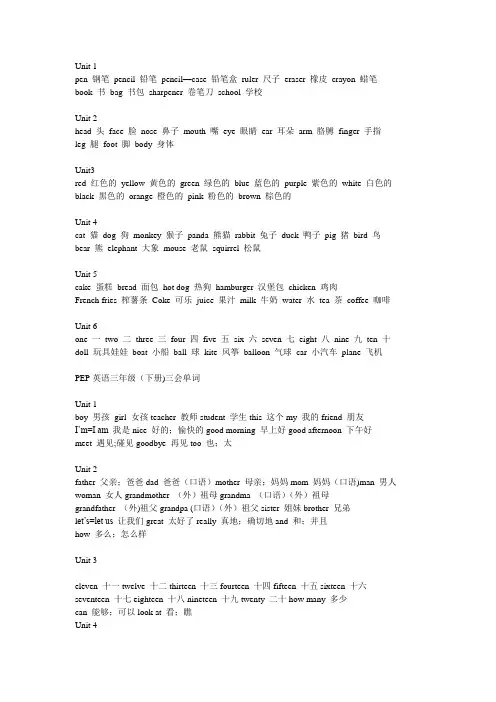
Unit 1pen 钢笔pencil 铅笔pencil—case 铅笔盒ruler 尺子eraser 橡皮crayon 蜡笔book 书bag 书包sharpener 卷笔刀school 学校Unit 2head 头face 脸nose 鼻子mouth 嘴eye 眼睛ear 耳朵arm 胳膊finger 手指leg 腿foot 脚body 身体Unit3red 红色的yellow 黄色的green 绿色的blue 蓝色的purple 紫色的white 白色的black 黑色的orange 橙色的pink 粉色的brown 棕色的Unit 4cat 猫dog 狗monkey 猴子panda 熊猫rabbit 兔子duck 鸭子pig 猪bird 鸟bear 熊elephant 大象mouse 老鼠squirrel 松鼠Unit 5cake 蛋糕bread 面包hot dog 热狗hamburger 汉堡包chicken 鸡肉French fries 榨薯条Coke 可乐juice 果汁milk 牛奶water 水tea 茶coffee 咖啡Unit 6one 一two 二three 三four 四five 五six 六seven 七eight 八nine 九ten 十doll 玩具娃娃boat 小船ball 球kite 风筝balloon 气球car 小汽车plane 飞机PEP英语三年级(下册)三会单词Unit 1boy 男孩girl 女孩teacher 教师student 学生this 这个my 我的friend 朋友I’m=I am 我是nice 好的;愉快的good morning 早上好good afternoon 下午好meet 遇见;碰见goodbye 再见too 也;太Unit 2father 父亲;爸爸dad 爸爸(口语)mother 母亲;妈妈mom 妈妈(口语)man 男人woman 女人grandmother (外)祖母grandma (口语)(外)祖母grandfather (外)祖父grandpa (口语)(外)祖父sister 姐妹brother 兄弟l et’s=let us 让我们great 太好了really 真地;确切地and 和;并且how 多么;怎么样Unit 3eleven 十一twelve 十二thirteen 十三fourteen 十四fifteen 十五sixteen 十六seventeen 十七eighteen 十八nineteen 十九twenty 二十how many 多少can 能够;可以look at 看;瞧Unit 4peach 桃pear 梨orange 橙子watermelon 西瓜apple 苹果banana 香蕉strawberry 草莓grape 葡萄like 喜欢some 一些;某些thanks 多谢Unit 5bus 公共汽车bike 自行车taxi 出租车jeep 吉普车desk 课桌chair 椅子walkman 随身听lamp 台灯your 你的;你们的zoo 动物园Unit 6small 小的big 大的long 长的short 短的;矮的tall 高的giraffe 长颈鹿deer 鹿PEP四年级(上册)四会单词词汇表Unit 1:window(窗户)board(写字板)light(灯,灯管)picture(画,图画)door (门)floor(地板) classroom(教室) computer(计算机)teacher’s desk(讲台)wall(墙)fan(扇子,电扇)classmate(同学) have(我们)有new(新的)go(去)where (在。
沪教版牛津英语A英语电子课本Module
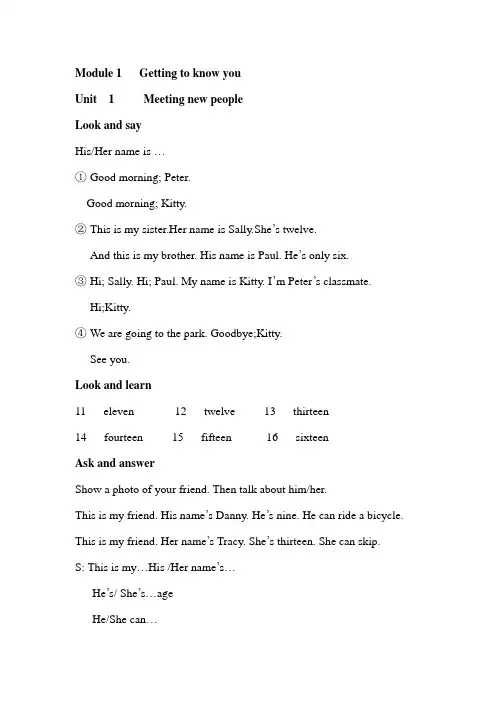
Module 1 Getting to know youUnit 1 Meeting new peopleLook and sayHis/Her name is …①Good morning; Peter.Good morning; Kitty.②This is my sister.Her name is Sally.She’s twelve.And this is my brother. His name is Paul. He’s only six.③Hi; Sally. Hi; Paul. My name is Kitty. I’m Peter’s classmate.Hi;Kitty.④We are going to the park. Goodbye;Kitty.See you.Look and learn11 eleven 12 twelve 13 thirteen14 fourteen 15 fifteen 16 sixteenAsk and answerShow a photo of your friend. Then talk about him/her.This is my friend. His name’s Danny. He’s nine. He can ride a bicycle. This is my friend. Her name’s Tracy. She’s thirteen. She can skip. S: This is my…His /Her name’s…He’s/ She’s…ageHe/She can…Say and actA new classmate①Good morning; class.Good morning; Miss Fang.②This is your new classmate. Her name’s Jill. She’s ten years old. Her student number is sixteen.Hi; I’m Jill.③You can sit here; Jill.OK. Thank you. Miss Fang.④Nice to meet you; Jill. My name’s Kitty. I’m nine. My student number is fifteen.Hi; Kitty. Nice to meet you;too.Look and readJill①We have a new classmate; Jill. She’s ten years old.②She lives near our school. She walks to school every day.③She likes reading; and she can play basketball well.④She can dance too. She likes dancing.True or false1.Jill is a new student.2.Jill’s home is near the school.3.Jill likes reading and dancing.4.Jill can play football.Listen and enjoyHello; Hello;My name is Joe.J-O-E; Joe.What about youHello; Hello;My name’s Rose.R-O-S-E; Rose.Nice to meet you; Joe.Learn the soundsk de sk ma sk Martin sits at his desk;Making a funny mask.‘Is it nice’ his grandma asksShe puts on the mask.And Martin laughs.Unit 1 AbilitiesListen and enjoyCan your pony singNo; he can’t.No; he can’t.Can your fish readNo; he can’t.No; he can’t.Can your cat climb a treeYes; he can.Yes; he can.Can your brother count to threeYes; he can.Yes; he can.Look and learnPaint draw read Write swim jump Look and sayCan he/she swimYes; he/she can./No; he/she can’t. Supergirl & SuperdogSupergirl is comingShe can run fast.She can swim well.She can fly high.Can Supergirl paint a pictureNo; he can’t; but she can run fast.Can she swimYes; he can swim very well.Can you swim;AliceYes; I can; I like swimming very much.Look and readA dream interview①Good evening. My name’s Kitty. Welcome to today’s ‘Super Time’.②This is our guest. Supergirl. And this is her dog; Superdog.Hello; everyoneWoof Woof③What can you do; SupergirlOh; I can run very fast. I can swim very well; and I can fly very high.④Can Superdog fly tooWoofYes; he can.⑤Thank you; Supergirl and Superdog You’re both superThank youRead and write1 Supergirl can _____ fast; _________ well; and ________very high.2 Superdog can _________too.3 Supergirl and Superdog are both __________.Play a gameAsk and answer in pairs. Make a card about your friend. Then give it to your teacher and play a guessing game.①Can you skip; DannyNo; I can’t.②Can you swimYes; I can swim well.③Name: DannyHe’s tall and big.He can swim well.He can’t skip.④This student is a boy. He’s nine. He’s tall and big. He can swim well;but he can’t skip. Who’s he⑤Is he DannyYes; he is.Ask and answertiger bird dolphin 海豚Monkey rabbitrun fast Climb trees swim hop flyS1: Can a tiger/bird/dolphin/monkey/rabbit…S2:Yes; it can; but it can’t … /No; it can’t; but it can …Learn the soundsp wasp crispsListen Little wa sp s.These are my cri sp s.Please go away.It’s not a good day for wa sp sTo play on my cri sp s.Unit 3 How do you feelLook and sayHow do you feelI’m / We’re …①I’m happy. I have a new skateboard.I’m sad. Look at my bicycle②We‘re back.How do you feelWe’re tired.③Are you hungryYes; we are.Have some biscuits.Thanks; Mum.④Are you thirsty; BenYes; I’m thirsty.Have some water then.Thank you; Mum.Look and learnhappy hungry thirsty sad full tired Play a gamePlay a guessing game.①How do you feel; DannyWowHappy②How does Danny feel; PeterIs he happyYes.Say and actSam and Ginger①Hi; Peter.②Sit down; please.Thank you.③Sorry. Sam is thirsty.But it’s Ginger’s water.④Are you thirsty too; GingerHere’s some water for you.Thanks; Peter. Sam is happy now.⑤They don’t like each other.Read a storyA thirsty crow①I’m a crow. It is hot and dry today. I’m thirsty and tired.②There is a bottle. It has some water in it③I’m so thirsty; but I can’t drink it. The bottle is too long and thin.④Here are some pebbles. I have an idea⑤One; two; three; … Great Now I can drink the waterI’m so happyRead; choose and write1 It is _________ and dry today. A cold B hot2 The crow is thirsty and __________ . A hungry B tired3 The crow sees ___________ . A some water in a bottle4 The crow puts some pebbles in the bottle.Now it _______ drink the water. A can B can’t Listen and enjoySusie is hungry.What does she wantA cake with cream and berries.That’s what she wants.Simon is thirsty.What does he wantA large bottle of lemonade.That’s what he wants.Learn the soundSt toa st po st man lamp po stNear the lamp po st;There’s a po st office.In the po st office;There’s a po st man.The po st man in the po st officeIs eating a piece of toa st.Module 2 Me; my family and friendsUnit 1 Jill’s familyLook and sayDo you have …Yes; I do. / No; I don’t.①Hi; JillHiWho’s that manOh; that’s my uncle. He’s my mother’s brother. He’s a police officer.②Do you have brothers and sistersNo; I don’t; but I have a cousin. Do you have unclesand aunts;Peter Yes; I do. I have one uncle and two aunts; and I have four cousins. Look and learnGrandfather ------------------- grandmotherFather ------- mother uncle --------- aunt Me cousinDo a surveyHow many brothers; sisters; aunts and cousins do your friends haveDo you have uncles and aunts; DannyYes; I have one uncle and two aunts.Do you have cousinsYes; I have one cousins.Say and actPhotos of Jill’s family①Hi; Kitty. Welcome to my home. Come and look at my new photos.OK.②Look at this boy. He’s tall. Is he your brotherNo. He’s my cousin. His name is Wang Rong.③How old is heHe’s eleven years old. He can swim very fast.④Who’s this manHe’s my uncle. He’s Wang Rong’s father. He can dive. Really He’s cool⑤This is you; Jill.Yes; that’s right.Read a storyMid-autumn DayOn Mid-autumn Day; Jill and her parents visit her grandparents.①Jill: Hello; Grandpa and GrandmaGrandpa: Hello; Jill Come in; please.②Dad: Let’s have some mooncakes and watch the beautiful moonin the garden.All: GreatDad: Jill; please come and help me.③Grandpa: I have a riddle for you; Jill. Sometimes it’s a ‘C’.Sometimes it’s an ‘O’. Sometimes you can see it; butsometimes you can’t. What is itJill: Is it ‘cloud’Grandpa: No. It’s an ‘O’ today.Jill: Ah; it’s the moonGrandpa: That’s right Look It’s big and bright in the skyTrue or false1 Jill and her parents are with her grandparents.2 They have mooncakes and watch the moon in the garden.3 The moon is a ‘C’ today.Listen and enjoyWho’s that Who’s thatWho’s that girl Who’s thatWho’s that girlIn the short black dressThat’s my cousin; Bess.Who’s that ladyIn the long red skirtWho’s that Who’s thatThat’s my auntIn the long red skirt.That’s my uncleIn the bright green shirt.Learn the soundsh dish fish wash Catch the fi sh. Spli sh Spli shWash the fi sh. Spla sh Spla shCook the fi sh. Swi sh Swi shWhere can I put the fi shOn a di sh On a di shUnit 2 JobsListen and enjoyLook at the fire;Fire; fire; fireCall the fire station;One; one; nineBring the fire engine.Engine; engine; engineThe brave firefightersPut out the fireLook and learnDoctor nurse teacher student Police officer firefighter cook bus driver Look and sayWhat does … doHe/She is …①What does your father do; JillHe is a firefighter.②What does your mother doShe is a nurse.③What does your father do; PeterHe is a teacher.④What does your mother doShe is a doctor.Play a gameMake the cards below. Then play the cards.Mrs White Mr Zhang teacher doctor nurse Mr Black Miss Wang Postman Policeman driver What does Mrs White do Is she a nurseNo; She isn’t.She is a teacher.S1: What does … do Is he/she…S2: Yes; he/she is a / an …/No;he/she isn’t. He/She is a / an …Look and readVisiting a fire station①Miss Fang : This is a fire station. This is Mr Xu. He’s Jill’s father.Students : Good afternoon; Mr Xu.Mr Xu : Good afternoon. Welcome to our fire station.②Mr Xu : This is a fire engine.Danny: Wow It’s so big③Peter: Fire is dangerous. Are you afraid; Mr XuMr Xu : No;I’m not. I’m a firefighter. I can help people. I likemy job.④Mr Xu : Don’t play with fire; children.Students : Yes; Mr Xu.⑤Students : Thank you; Mr XuMr Xu : You’re welcome. ByeRead and tick1 Mr Xu and the students are at the fire station / police station.2 Mr Xu is a police officer / firefighter.3 The fire engine is big / small.4 Mr Xu likes / does’t like his job.Ask and answerFill in the table below. Then ask and answer with your classmates.What does your father doHe is a firefighter.Learn the soundsdr dr ess pr pr incess The pr incess has a dr eam.In her dr eam she buys a pr etty dr ess.She likes the dr essAnd doesn’t care about the pr ice.Unit 3 I have a friendLook and sayHe/She has …①I have a friend. His name’s Tom. He’s tall and thin. He has a greenT-shirt and a pair of blue shorts. He can skate.②I have two friends. They’re Peter and his sister Sally. Peter has anorange T-shirt. He can ride a bicycle. Sally has a pink skirt. She can fly a kite.Look and learncoat shirt blouse T-shirtskirt sweater jeans shortsPlay a gameRead and guess①I have a friend She has a dress. It’s red and white. She’s…②I have a friend. He has a T-shirt. It’s green and grey. He’s…③I have a friend. She has a skirt. It’s purple. She’s …④I have a friend. He has a shirt. It’s blue and white. He’s …Read a storyThe lion and the mouse①This is a lion. It is big. It is strong. It has big teeth.②This is a mouse. It is small. It has small but sharp teeth.③The lion is in a net. It is afraid. The mouse is afraid too.④The mouse can bite. It can help the lion.⑤The lion and the mouse are happy. They are friends now.Read; choose and write1 The lion is ___________ . a strong b thin2 The mouse has _________ teeth. a big b small3 The ________ is in the net. a mouse b lion4 The mouse and the lion are _______ a sad b happy Listen and enjoyShort shortsShort shorts today; they’re wearing short shorts today.The girls are all wearing long jackets; white T-shirts;Black socks and short shorts; short shorts.Jackets today; they’re wearing jackets today.The boys are all wearing long jackets; black T-shirts;White socks and short shorts; short shorts.T-shirts today; they’re wearing T-shirts today.The kids are all wearing long T-shirts; long jackets;Long socks and short shorts; short shorts.Think and writeWrite about a friend in your class.Learn the soundsbr br ead cr ice cr eam Br yan likes ice cr eam.He likes br ead too.He puts some ice cr eamOn the br ead;And eats the ice cr eamWith the br ead.。
沪教牛津版九年级英语上册单词表
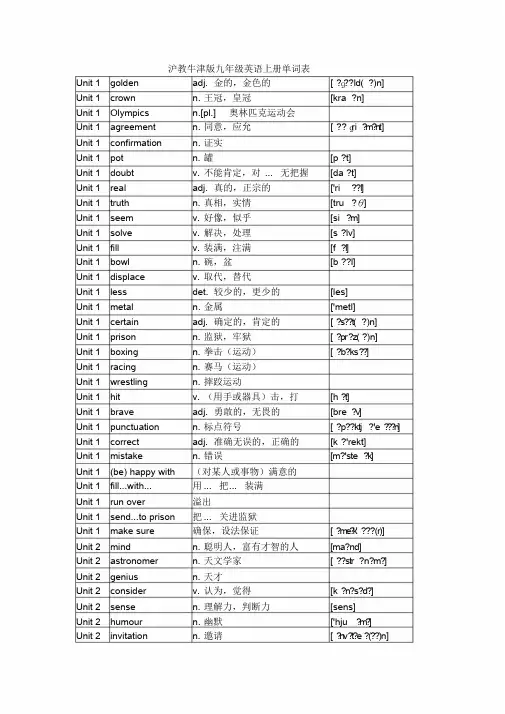
沪教牛津版九年级英语上册单词表Unit 1 golden adj. 金的,金色的[ ?ɡ??ld( ?)n] Unit 1 crown n. 王冠,皇冠[kra ?n]Unit 1 Olympics n.[pl.] 奥林匹克运动会Unit 1 agreement n. 同意,应允[ ??ɡri ?m?n t] Unit 1 confirmation n. 证实Unit 1 pot n. 罐[p ?t]Unit 1 doubt v. 不能肯定,对... 无把握[da ?t]Unit 1 real adj. 真的,正宗的['ri ??l]Unit 1 truth n. 真相,实情[tru ?θ]Unit 1 seem v. 好像,似乎[si ?m]Unit 1 solve v. 解决,处理[s ?lv]Unit 1 fill v. 装满,注满[f ?l]Unit 1 bowl n. 碗,盆[b ??l]Unit 1 displace v. 取代,替代Unit 1 less det. 较少的,更少的[les]Unit 1 metal n. 金属['metl]Unit 1 certain adj. 确定的,肯定的[ ?s??t(?)n] Unit 1 prison n. 监狱,牢狱[ ?pr ?z( ?)n] Unit 1 boxing n. 拳击(运动)[ ?b?ks ??]Unit 1 racing n. 赛马(运动)Unit 1 wrestling n. 摔跤运动Unit 1 hit v. (用手或器具)击,打[h ?t]Unit 1 brave adj. 勇敢的,无畏的[bre ?v]Unit 1 punctuation n. 标点符号[ ?p??ktj ?'e ???n] Unit 1 correct adj. 准确无误的,正确的[k ?'rekt]Unit 1 mistake n. 错误[m?'ste ?k]Unit 1 (be) happy with (对某人或事物)满意的Unit 1 fill...with... 用... 把... 装满Unit 1 run over 溢出Unit 1 send...to prison 把... 关进监狱Unit 1 make sure 确保,设法保证[ ?m e?k' ???(r)] Unit 2 mind n. 聪明人,富有才智的人[ma?nd]Unit 2 astronomer n. 天文学家[ ??str ?n ?m?] Unit 2 genius n. 天才Unit 2 consider v. 认为,觉得[k ?n?s ?d?]Unit 2 sense n. 理解力,判断力[sens]Unit 2 humour n. 幽默['hju ?m?]Unit 2 invitation n. 邀请[ ?n v?t?e ?(??) n]Unit 2 theory n. 学说,论,说[ θ???r e t?k(?)l] Unit 2 university n. (综合性)大学[ ?ju ?n?'v??s?ti] Unit 2 pleasure n. 乐事,快事['ple ??]Unit 2 avoid v. 避免,避开[ ??v??d]Unit 2 lecture n. 讲座,演讲[ ?lekt ??]Unit 2 tonight adv. 在今晚,在今夜[t ?'na ?t]Unit 2 audience n. 观众,听众[' ??d??ns]Unit 2 trust v. 信任,信赖[tr ?st]Unit 2 seat n. 座位[si ?t]Unit 2 applause n. 鼓掌,喝彩Unit 2 pale adj. 苍白的[pe ?l]Unit 2 achievement n. 成就,成绩[ ??t ?i?vm?nt] Unit 2 universe n. 宇宙['ju ?n?v??s] Unit 2 philosopher n. 哲学家Unit 2 obey v. 服从,遵守[ ???b e?]Unit 2 reduce v. 减少,缩小[r ?d?j u?s]Unit 2 exactly adv. 精确地,准确地[ ?g'z?ktli]Unit 2 action n. (故事、戏剧等中的)情节[ ??k ?( ?)n]Unit 2 sense of humour 幽默感Unit 2 let...down 使... 失望Unit 2 by heart 单凭记忆,能背诵Unit 2 take a seat 坐下[ ?te ?k? 'si ?t]Unit 2 withoutdifficulty轻而易举Unit 2 join in 参加,加入Unit 2 have no idea 丝毫不知道Unit 2 (be)in trouble 倒霉,处于困境Unit 2 play a joke onsb.跟某人开玩笑,捉弄某人Unit 2 turning point 转折点Unit 2 a series of 一系列Unit 3 meal n. 一顿饭[mi ?l]Unit 3 share v. 把自己的想法(或经历、感情)告诉(某人)[ ?e?]Unit 3 decision n. 决定,抉择[d ?'s??n?] Unit 3 possessions n.[pl.] 个人财产,私人物品Unit 3 expect v. 要求,指望[ ?ks'pekt] Unit 3 abroad adv. 在国外,到国外[ ?'br ??d] Unit 3 business n. 商务,公事['b ?zn?s]Unit 3 personal adj. 个人的,私人的['p ??s?nl] Unit 3 set v. 安排、确定、决定[set]Unit 3 daughter n. 女儿['d ??t?] Unit 3 mind v. 介意[ma?nd] Unit 3 fashionable adj. 流行的,时髦的Unit 3 fashion n. 流行款式,时兴式样[ ?f???n] Unit 3 out of date adj. 过时的Unit 3 iron n. (用熨斗)熨,烫平[ ?a??n]Unit 3 event n. 公开活动[ ?'vent] Unit 3 suppose v. (根据所知)认为[s ?'p ??z] Unit 3 either adv. (用于否定词组后)也不['i ?e?] Unit 3 relationship n. 关系,联系[r ? l?e???n??p] Unit 3 invite v. 邀请[ ?n'va ?t] Unit 3 cost v. 需付费,价钱为[k ?st]Unit 3 type n. 类型,种类[ta ?p]Unit 3 help with 帮着做Unit 3 (be)on business 出差Unit 3 have no interestin对... 没有兴趣Unit 4 online adj. 在线的[ ??n?la ?n] Unit 4 model n. 模特儿[ ?m?dl]Unit 4 diet n. 规定饮食(为健康或减肥等目的)[da ?]Unit 4 though conj. 虽然,尽管[ e? ?]Unit 4 awful adj. 很坏的,极讨厌的[ ??f??l]Unit 4 ashamed adj. 惭愧,羞愧[ ??e??m d]Unit 4 situation n. 情况,状况[s ?tj ??e?(??)n] Unit 4 braces n.[pl.] (儿童)牙箍Unit 4 hate v. 厌恶,憎恶[he ?t]Unit 4 advantage n. 优势[ ?d?vɑ?nt ?d?] Unit 4 embarrassed adj. 窘迫的,尴尬的[ ?m'b?r ?st] Unit 4 suggest v. 建议,提议[s ??d?est] Unit 4 mad adj. 很生气,气愤[m?d]Unit 4 mess n. 杂乱,不整洁[mes]Unit 4 annoying adj. 使恼怒的,使生气的Unit 4 fail v. 不及格[fe ?l]Unit 4 careless adj. 粗心造成的['ke ?l ?s]Unit 4 comment n. 评论[ ?k?ment] Unit 4 request n. 要求,请求[r ?k?west]Unit 4 polite adj. 有礼貌的[p ??la ?t] Unit 4 none pron. 没有一个,毫无[n ?n] Unit 4 exam n. 考试[ ?g'z?m] Unit 4 (be)on a diet 节食Unit 4 laugh at 嘲笑,讥笑['l ɑ?f?t] Unit 4 feel ashamed of 对... 感到羞愧Unit 4 drive sb. mad 让某人受不了Unit 4 make a mess 搞得一塌糊涂Unit 4 out of place 格格不入Unit 4 none of one'sbusiness与某人无关Unit 4 hear from 收到某人的信件(或电子邮件、电话等)Unit 5 praise n. 赞扬,称赞[pre ?z] Unit 5 view v. 看,观看[vju ?]Unit 5 script n. 广播(或讲话等)稿Unit 5 director n. 导演[d ?r?ekt ?] Unit 5 make-up n. 化妆Unit 5 artist n. 艺术家[' ɑ?t?st] Unit 5 studio n. 演播室[ ?stju ?d???] Unit 5 contestant n. 比赛者Unit 5 upon prep. 在... 上面[ ??p?n] Unit 5 among prep. 在... 中[ ?'m ??] Unit 5 onto prep. 向,朝[ ??ntu ?] Unit 5 forward adv. 向前[ ?f??w?d] Unit 5 second n. 秒(时间单位)['sek ?nd] Unit 5 relaxed adj. 放松的,冷静的[r ?'l?kst] Unit 5 ahead of prep. 领先Unit 5 beat v. 赢,打败(某人)[bi ?t]Unit 5 still adj. 平静的,安静的[st ?l]Unit 5 single adj. 仅有一个的,单个的['s ??gl] Unit 5 victory n. 胜利,成功[ ?v?kt ?ri] Unit 5 England n. 英格兰[' ??gl ?nd] Unit 5 lucky adj. 幸运的,运气好的['l ?ki] Unit 5 news n. 新闻报道[nju ?z] Unit 5 survey n. 民意调查[s ??'ve ?] Unit 5 floor plan 楼层平面图Unit 5 talent show 达人秀Unit 5 pass out 昏迷,失去知觉Unit 5 keep still 保持静止,保持不动(的状态)Unit 5 emergency exit 紧急出口Unit 5 on weekday 在工作日(周一至周五)Unit 6 preference n. 偏爱,喜爱[ ?pref ?r ?ns] Unit 6 review n. 评价,评论[r ?'vju ?] Unit 6 bean n. 豆,豆荚[bi ?n]Unit 6 beef n. 牛肉[bi ?f]Unit 6 product n. 产品,制品[ ?pr ?d?kt] Unit 6 protein n. 蛋白质Unit 6 hamburger n. 汉堡包['h ?mb??g?] Unit 6 cola n. 可乐['k ??l ?] Unit 6 sandwich n. 三明治['s ?ndw?t ?] Unit 6 salad n. 色拉[ ?s?l ?d] Unit 6 medical adj. 医疗的[ ?m e d?k(?)l] Unit 6 fat n. 脂肪[f ?t]Unit 6 sugar n. 食糖[' ??g?]Unit 6 state v. 说明[ste ?t]Unit 6 necessary adj. 必需的,必要的['nes ??s?ri] Unit 6 research n. 研究,调查[r ?s???t?] Unit 6 plenty pron. 大量,充足[pli ?zd] Unit 6 usual adj. 通常的,寻常的['ju ???l] Unit 6 coffee n. 咖啡[ ?k?fi]Unit 6 treat v. 买(可享受的东西)[tri ?t]Unit 6 customer n. 顾客[ ?k?st ?m?] Unit 6 title n. 标题,题目[ ?t?u???t??s j u ?] Unit 6 serve v. 提供[s ??v]Unit 6 pound n. 英镑[pa ?nd]Unit 6 pie n. 果馅饼,果馅派[pa ?]Unit 6 chip n. 炸薯条[t ??p]Unit 6 service n. 服务[ ?s??v?s]Unit 6 seat v. (使)就座[si ?t]Unit 6 a balanced diet 均衡饮食Unit 6 dairy product 乳制品Unit 6 stay away from 离开,不接近Unit 6 fried food 油炸食品Unit 6 soft drink 软饮料(不含酒精)Unit 6 medicalexamination体格检查Unit 6 lose weight 减肥Unit 6 plenty of 大量,充足Unit 6 in general 通常,大体上Unit 6 treat oneself tosth.给自己买某物Unit 6 (be)prepared todo sth.愿意做某事Unit 7 adventure n. 冒险,冒险经历[ ?d?vent ??] Unit 7 novel n. (长篇)小说[ ?n?v ?l]Unit 7 frog n. 蛙,青蛙[fr ?ɡ]Unit 7 congratulations n.[pl.] 祝贺,恭贺Unit 7 sympathy n. 同情[ ?s?m p?θi] Unit 7 steamboat n. 汽船,轮船Unit 7 steam n. 蒸汽动力,蒸汽[sti ?m] Unit 7 writer n. 作家['ra ?t?] Unit 7 humorous adj. 滑稽有趣的,有幽默感的[ ?hju ?m?r ?s] Unit 7 fence n. 栅栏,篱笆[fens]Unit 7 task n. 任务,工作[t ɑ?sk]Unit 7 yard n. 码(长度单位)[j ɑ?d]Unit 7 board v. 木板[b ??d]Unit 7 survey v. 查看,审视[s ??'ve ?] Unit 7 progress n. 进展['pr ??ɡres] Unit 7 rest n. 休息时间[rest]Unit 7 pity n. 遗憾,可惜['p ?ti]Unit 7 silence n. 沉默,缄默[ ?sa?l?ns] Unit 7 while n. 一段时间,一会儿[hwa?l]Unit 7 careful adj 小心,谨慎['ke ?f ?l] Unit 7 deal n. 交易[di ?l]Unit 7 coat n. 涂料层,覆盖层[k ??t]Unit 7 celebrated adj. 著名的,闻名的Unit 7 lead n. 铅[li ?d]Unit 7 plot n. 故事情节[pl ?t]Unit 7 lazy adj. 懒惰的['le ?zi]Unit 7 pretend v. 假装,佯装[ ?pre ??]Unit 7 have a rest 休息一下Unit 7 think of 想象到Unit 7 come along 出现Unit 7 what a pity 真可惜Unit 7 go on doing 不停的做Unit 7 in silence 沉默地Unit 7 after a while 过了一会Unit 7 turn sth. over 使翻转Unit 7 trick sb.intodoing sth.诱使某人做某事Unit 8 gift n. 礼物[ ɡ?ft]Unit 8 graduation n. 毕业典礼[ ɡr ?dj ??e?(??)n] Unit 8 cent n. 分,分币[sent]Unit 8 count v. 计算(或清点)总数[ka ?nt]Unit 8 afford v. 买得起[ ?'f ??d]Unit 8 present n. 礼物['preznt]Unit 8 knee n. 膝,膝盖[ni ?]Unit 8 sign n. 招牌,标牌[sa ?n]Unit 8 goods n.[pl.] 商品,货品[ ɡ?d]Unit 8 search v. 搜寻,查找[s ??t?]Unit 8 chain n. 链子[t ?e?n]Unit 8 bill n. 账单[b ?l]Unit 8 step n. 脚步声[step]Unit 8 draw v. 掏出[dr ??]Unit 8 set n. 一套,一组[set]Unit 8 comb n. (作为装饰物的)发插,梳子[k ??m]Unit 8 accuse v. 控告,控诉[ ??kju ?z] Unit 8 America n. 美洲[ ?'mer ?k?] Unit 8 wife n. 妻子[wa?f]Unit 8 album n. 相册,影集[ ??lb ?m] Unit 8 note n. 笔记,记录[n ??t] Unit 8 look for 寻找,寻求['l ?kf ?r] Unit 8 at last 终于,最终[ ?t'l ɑ?st] Unit 8 fix...on 集中(目光、注意力等)于Unit 8 hold out 递出Unit 8 (be)accused of 被控告...Unit 8 under the nameof 用... 的名字,以... 假名单纯的课本内容,并不能满足学生的需要,通过补充,达到内容的完善教育之通病是教用脑的人不用手,不教用手的人用脑,所以一无所能。
沪教版(上海)牛津英语知识点汇总
沪教版(上海)牛津英语知识点汇总Module1Unit1一,核心词汇1.first第一2.second第二3.third第三4.fourth第四5.fifith第五6.sixth第六7.party派对,聚会8.begain 开始9.bring带来10.wear穿着11.favourite最喜欢的二,词组1. at Peter’s birthday party在Peter的生日聚会上2. on the 19th of September在9月19日3. on Sunday在周日4.at two o’clock在两点5. in the afternoon在下午6. at night在晚上7. sb. be tired 某人很累8. my favourite color我最喜欢的颜色9. That sounds interesting.那听上去有趣10. I can’t wait!我等不及了!11. Happy Birthday!生日快乐12. Welcome to my party.欢迎来我的派对13. a pair of orange trousers一条橙色的裤子14. make a birthday invitation制作一张生日请帖15. make a hat制作一顶帽子16. have some fun过得高兴17. birthday present生日礼物三,词汇解释1.bring,take,carry辨析bring是指把人或物从别处带到说话人所在的地方。
例如:Bring me some water, please.请给我取点水来。
carry及物动词,“搬运,运送”,一般是指搬运较重的物品。
例如:carry a box on one’s shoulder扛着箱子carry a baby on one’s back背着孩子“携带,带”例如:Almost every teacher carries a watch.差不多每位教师都带着一只表。
沪教版牛津英语七年级上册7A-unit6教案
物质名词, 修饰可数名词复数时 school 一般在其前加数量词。 all 要把限定词放在其后而 all 能用 all the money 于各种情况
7
在外部且不接壤
14.…or get a bird ’s-eye view of the whole park by riding in a cable car.(page82) ……或通过坐缆车鸟瞰整个公园。
(1)whole 作形容词,意为“全部的,所有的,完整的” ; 作名词,意为“全部,全体,整体”。 the whole school I have
详细讲解:
1.My head was made there我. 的头就产于那儿。 (page73)
be made in+地点,意为“产于某地”,由于 there 是地点副词,故 去掉介词 in.
成品 +be made in+ 产于某地 原 料 +be made … … 被 制
地点
into+ 成品
成……
mother.
The table is made of wood.
Wine is made from grapes.
2
Grapes are made into wine.
The bike is made in China.
2.People’s Square is in the centre of Shanghai人. 民广场在上海的中
新版牛津英语上海版A知识点归纳
新版牛津英语上海版A知识点归纳1.问候与自我介绍:- Hello! Hi! Good morning!等常见的问候用语。
- What’s your name? My name is...等自我介绍用语。
2.数字与颜色:-数字1-10的基本表达。
- 常见颜色的英文表达,如红色(red)、绿色(green)等。
3.询问年龄与身体状况:- How old are you? I’m...等询问年龄的用语。
- How are you? I’m fine/good.等询问身体状况的用语。
4.询问喜欢与不喜欢的事物:- Do you like...? Yes, I do./No, I don’t.等询问喜欢事物的用语。
- What do you like? I like...等回答自己喜欢的事物的用语。
5.熟悉家庭与常见动物:- 基本的家庭成员的表达,如father、mother、brother、sister等。
- 常见动物的英文表达,如dog、cat、bird等。
6.询问与描述外貌与人物特征:- What’s he/she like? He/She is...等询问与描述外貌与人物特征的用语。
7.学习日常用语:- May I go to the toilet, please? Can I have some water, please?等日常学习用语。
8.描述天气与季节:- What’s the weather like today? It’s sunny/rainy/cloudy.等描述天气的用语。
- 四个季节的英文表达,如spring、summer、autumn、winter等。
9.描述日常活动与习惯:- I get up at 7 o’clock. I go to school at 8 o’clock.等描述日常活动与习惯的用语。
10.描述食物与饮料:- 常见食物与饮料的英文表达,如apple、orange、milk、juice等。
沪教版(上海)牛津英语知识点汇总
沪教版(上海)牛津英语知识点汇总Module1Unit1一,核心词汇1.first第一2.second第二3.third第三4.fourth第四5.fifith第五6.sixth第六7.party派对,聚会8.begain 开始9.bring带来10.wear穿着11.favourite最喜欢的二,词组1.at Peter’s birthday party在Peter的生日聚会上2.on the19th of September在9月19日3.on Sunday在周日4.at two o’clock在两点5.in the afternoon在下午6.at night在晚上7.sb.be tired 某人很累8.my favourite color我最喜欢的颜色9.That sounds interesting.那听上去有趣10.I can’t wait!我等不及了!11.Happy Birthday!生日快乐12.Welcome to my party.欢迎来我的派对13.a pair of orange trousers一条橙色的裤子14.make a birthday invitation制作一张生日请帖15.make a hat制作一顶帽子16.have some fun过得高兴17.birthday present生日礼物三,词汇解释1.bring,take,carry辨析bring是指把人或物从别处带到说话人所在的地方。
例如:Bring me some water, please.请给我取点水来。
carry及物动词,“搬运,运送”,一般是指搬运较重的物品。
例如:carry a box on one’s shoulder扛着箱子carry a baby on one’s back背着孩子“携带,带”例如:Almost every teacher carries a watch.差不多每位教师都带着一只表。
- 1、下载文档前请自行甄别文档内容的完整性,平台不提供额外的编辑、内容补充、找答案等附加服务。
- 2、"仅部分预览"的文档,不可在线预览部分如存在完整性等问题,可反馈申请退款(可完整预览的文档不适用该条件!)。
- 3、如文档侵犯您的权益,请联系客服反馈,我们会尽快为您处理(人工客服工作时间:9:00-18:30)。
6A Unit 1Phrases:1.family tree 家谱2.a lot of 许多3.birthday card 生日卡片4.get…from…从…得到…5.happy birthday 生日快乐6.go shopping 去购物7.what else 别的什么8.play badminton 打羽毛球9.play games 玩游戏10.play football 踢足球11.go swimming 去游泳12.go cycling 去骑车13.go to a restaurant 去饭店14.go to the park 去公园15.watch TV 看电视16.watch a film 看电影Exercises for Unit 1I. Choose the best answer. (选择最佳答案)1.( ) I have _______ aunt and _______ uncle.A. an; anB. an; aC. a; anD. a; a2. ( ) A: I have two aunts.B: I have two aunts, _______.A. onlyB. tooC. eitherD. also3. ( ) Kitty _______ finishes her homework on time. She never leaves it for tomorrow.A. neverB. alwaysC. sometimesD. usually4. ( ) Tom has got a lot of Christmas cards _______ his good friends.A. withB. byC. fromD. at5. ( ) Mary usually _______ her homework after dinner.A. doB. doesC. writeD. writes6. ( ) Danny usually goes fishing with _______ uncle.A. heB. hisC. he’sD. him7. ( ) Joe is my father’s brother. He is my _______.A. cousinB. auntC. brotherD. uncle8. ( ) Do you want to make a kite _______ your sister?A. onB. toC. forD. at9. ( ) What _______ do you usually do at weekends?A. otherB. elseC. alsoD. too10. ( ) I usually go to the restaurant _______ my good friend.A. withB. aboutC. toD. at11. ( ) How many uncles _______ Mary _______?A. is… thereB. are… thereC. has…gotD. have…got12. ( ) Alice, _______ my new friend Bill.A. he isB. she isC. that isD.this is13. ( ) A: what do you often help your mother do?B: I often _______.A. go to the cinemaB. watch TVC. wash the dishesD. walk in the park14. ( ) How much _______ do you want, Kitty?A. eggsB. booksC. milkD. cakes15. ( ) On Sundays, Susan likes to _______ with her cousin.A. going shoppingB. shoppingC. go to shoppingD. go shoppingII. Complete the sentences with the given words in their proper forms.(用所给单词的适当形式填空)1.The students are planning to interview __________ (they) parents.2.I usually go __________ (swim) with my mum.3.The two ___________ (family) from Canada will visit Shanghai next week.4.Does Mr. Smith come to China for the ________ (one) time?5.What else do you do with ________ (he)?6.Alice has got a lot of birthday ________ (card) from her family andrelatives.III. Rewrite the following sentences.(按要求改写句子)1.I sometimes play badminton with my brother. (改为否定句)I ________ _______ badminton with my brother.2.I have three aunts .(划线提问)________ _________ aunts do you have?3.This is my cousin.(改为复数)_________ _________ my __________.4.My family is big. Your family is bigger.(用than连成一句)Your family is _______ _______ my family.5.I usually go cycling with my father.(划线提问)________ do you usually ________ with your father?6.She always watches TV after dinner.(一般疑问句)________ she always ________ TV after dinner?IV. Write out the words according to the sounds.(根据音标写出单词)6%1. /✍✍✍✍✍✍ / __________2./✍✍✍✍✍✍✍✍/____________3. / ✍✍✍✍✍✍✍✍/ __________4. /✍✍✍/ _____________5. / ✍✍✍✍✍✍/ __________6. /✍✍✍✍✍✍✍✍✍✍(✍) /_____________V. Find the word which has the same sound to the word given.(选出与划线部分发音相同的选项)( ) 1. relative A. she B. cinema C. red D. people ( ) 2. cycle A. yes B. cry C. sorry D. baby( ) 3. badminton A. cake B. family C. car D. father ( ) 4. cousin A. south B. house C. loud D. young ( ) 5. shop A. nose B. cold C. stop D. colourVI. Choose the right word to complete the sentences.(选择适当的词填空)1.Alice and her sister ______________ (has, have) got a very big bedroom.2.Do you have ______________ (some, any) questions to ask?3.She is very helpful. She likes to help ______________ (other, others).4.Kitty likes to show us a photo ______________ (with, of) he family andrelatives.5.My grandparents can play ______________ (/, the) basketball in theafternoon.VII. Fill in the blanks with the proper forms of the given verbs.(用所给动词的适当形式填空)1.Mr. Smith sometimes ______________ (go) to the cinema with his wife.2.The little girl can’t ____________ (run) fast.3.My parents never ____________ (dance) together.4.Alice ____________ (not be) from the USA.5.Mary likes ___________ (run) in the morning.6.It often __________ (rain) in Shanghai in spring.7.Kitty _________ (have) got a very nice bedroom.8._________ you usually __________ (watch) TV with your family?Reading and WritingⅠ.Read the passage and fill in the blanks with proper words.(在短文的空格内填入适当的词,使其内容通顺,每空格限填一词,首字母已给)My family is a big one. There are eleven p_______ in my family. My grandfather and g________ are both teachers. My father is a doctor. My mother is a nurse. They work hard. I o_______ have one aunt. Her name is Sue. She has a d_________. My c_______ and I are students.My name is Alice. I study a_____ No.3 Middle School. I like drawing.I u________ go shopping with my a_______ and sometimes play b_________ with her, too. I love my family m_________.Ⅱ.Choose the words or expressions and complete the passage.(选择最恰当的单词,完成短文)Mr. Brown __1__ a big garden. There are ___2___ trees and flowers in it. The flowers are very __3__. Some flowers are red, some flowers are yellow. He loves the garden __4__ much. His ___5___ often play near it. His two daughters __6__kites and his four sons play football. What a big family he has! And __7__ happy they are!( ) 1. A. have B. has C. had D. have not( ) 2. A. much B. any C. many D. a lot( ) 3. A. too beautiful B. much beautifulC. beautifulD. beautifully( ) 4. A. too B. more C. very D. a lot( ) 5. A. children B. child C. brother D. wife( ) 6. A. fly B. flys C. are flying D. flies( ) 7. A. what B. what a C. how a D. howⅢ. Answer the questions according to the passage.(根据文章内容回答问题)Most English people have three names: a first name, a middle name and the family name. Their family name comes last. For example, my full name is Jim Allan Green. Green is my family name. My parents gave me both of my other names.People don’t use their middle names very much. So “John Henry Brown” is usually called “John Brown”. People never use Mr., Mrs. or Miss before their first names. So you can say John Brown, or Mr. Brown; but you should never say Mr. John. They use Mr., Mrs. or Miss with the family name but never with the first name.Sometimes people ask me about my name. “When you were born, why did y our parents call you Jim?” they ask.” Why did they choose that name?” The answer is they didn’t call Jim. They called me James. James was the name of my grandfather. In England, people usually call me Jim for short. That’s because it is shorter and easier than James.1.How many names do most English people have?______________________________________2.What is Jim’s family name?______________________________________3.What do English people use Mr., Mrs. or Miss with?______________________________________4.Why do people usually call the writer Jim instead of James?______________________________________5.What’s your English name?______________________________________Ⅳ. Write at least 60 words about the topic “I have a happy family”(就“我有一个幸福的家庭”为题,写至少5句话)Suggested outlines:(文章必须包含下列要点)1.What’s your family like?2.Tell something about your family and relatives.3.Do you like your family? Why?KeyI. Choose the best answer.1-5 ABBCB 6-10 BDCBA 11-15 CDCCDII. Complete the sentences with the given words in their proper forms: their swimming families first him cardsIII. Rewrite the following sentences:1. never/don’t play2.how many3.these are …cousins4.bigger than5.What …do6.Does… watchIV. Write out the words according to the sounds:1.only2.grandson3.relative4.else5.cycle6.granddaughterV. Find the word which has the same sound to the word given1. C2. B3.B4.D5.CVI. Choose the right word to complete the sentences.1. have2. any3.others4.of5./VII. Fill in the blanks with the proper forms of the given verbs.1. goes2. run3. dance4. isn’t5. running6. rains7. has8. Do…watchReading and WritingⅠ.Read the passage and fill in the blanks with proper words1.people2.grandmother3.only4.daughter5.cousin(s)6.atually8.aunt9.badminton/basketball10.membersⅡ.Choose the words or expressions and complete the passage1. B2. C3.C4.C5.A6.A7. DⅢ. Answer the questions according to the passage1. Three2. Green3. the family name4. Because it is shorter and easier than James.。
